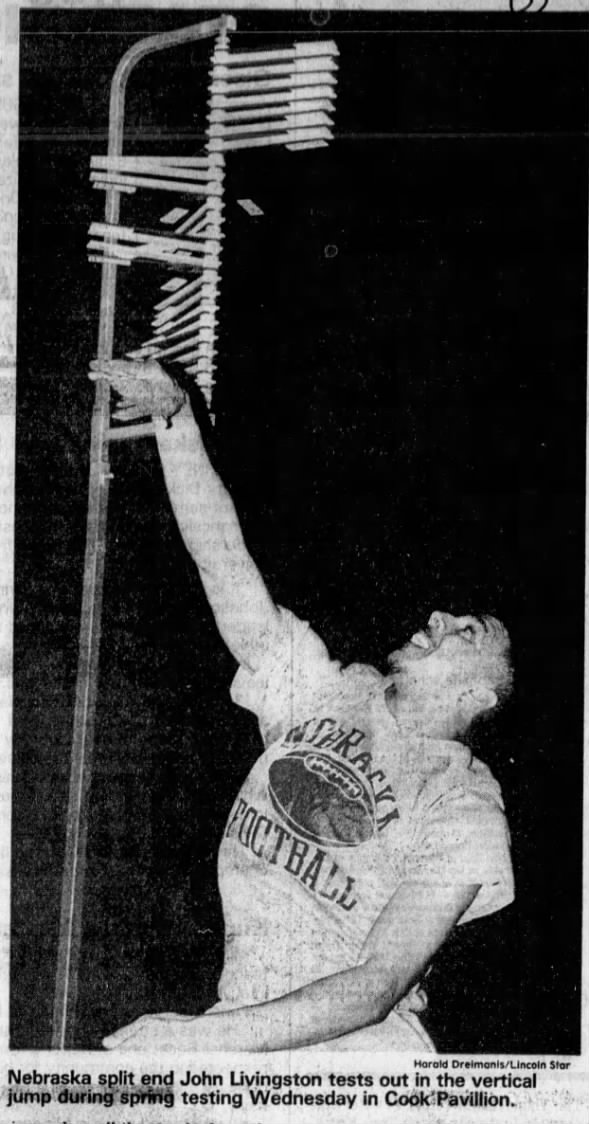Anatomy of an Era: John Livingston, Part 2
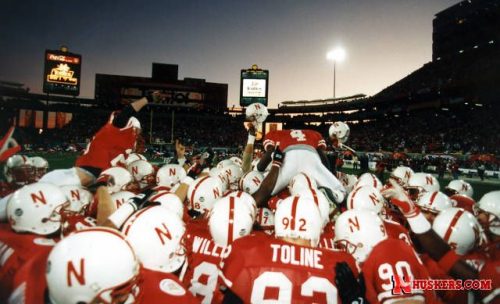
Excerpted from Chapter 100, No Place Like Nebraska: Anatomy of an Era, Vol. 2 by Paul Koch
Anatomy of an Era: John Livingston, Part 2
JL: But I tell you what, one thing I’ll never forget, and I’ll take this to my grave: Coach Osborne was the most incredible person -next to my position coach- the most incredible person. Here’s me, a person who grew up with a single mom and a step-dad who was not athletic and had zero understanding of sports, so Coach Osborne was this grandfather figure.
And you’d go through these tremendous workouts and practices, and at the end you’d be sitting there totally exhausted. And you know he had that quadruple bypass surgery or whatever he had, and he’s running laps around the stadium. And then we get into the gym for workouts after practices, and Coach Osborne -I’ll never forget- he walks up to me as I was warming up and had like 175 on the bar and he’s like, “Hey Livingston, you mind if I jump in there?” (laughs) And I’m thinking to myself, ‘Is this guy serious?!’ (laughs) That’s why they say, “You’re Doctor Tom.” What is it, Doctor of Psychology, maybe? That guy knew stuff beyond anything that was rational. It was unbelievable.
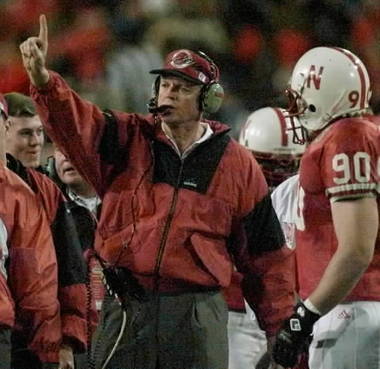
Q: Tell me about Coach Ron Brown’s methods. What did he bring to the table?
JL: Wow, Coach Brown was the most unique staff member. And of course, I’m telling you this now, years after I’ve realized what I had. I called him -I think it was two years ago- because I hadn’t spoken to him since I’d left. And we spoke for hours and I cried and I poured my heart out to him and thanked him for all he did for me.
He was the single individual on a pretty amazing staff from back then -with Solich and Turner Gill going off, all these guys were wonderful- but Coach Brown was the single most beautiful, purest-hearted individual that I’ve ever met in my life. He was so spiritual, so honest, there was no sugarcoating. He would tell you what it is. After his first stint he stayed on board with the Fellowship of Christian Athletes and was a part of that, and I’ve admired him so much and wished that I’d had the brainpower I have now to really to appreciate him and cherish him in that regard. But nevertheless, if I had to say, he was the purest of all the staff members next to, obviously, Coach Osborne. He was like the dad I never had.
Q: What would he talk about, repeat to you, drill into your heads?
JL: Well, like I told him when I spoke with him, I said, ‘Coach, I wish I had listened more. (laughs) I wish I had followed your lead and took your suggestions and recommendations and come in and did the film stuff and all these things that really were integral parts in being part of a team of that magnitude.’ And I think… I don’t know, I can’t really answer the question why at that age you think other things are more important than the things people are trying to tell you.
Q: I heard an old saying the other day: “Youth is wasted on the young.”
JL: Yes! There you go! (laughs)
Q: Any other coaches or relationships that made the place unique?
JL: Oh absolutely, names are starting to come back in my head. Boyd Epley -and keep in mind I came in with this ego and, ‘I’m good. I’m good enough. I’ve made it here and I don’t need to work out’- and Boyd put it into my head and found a way that nobody else could find! He essentially said, “Listen, son, I know that you’re good. But look around you: we have guys who are just as good as you or even better. And they’ve come to me with this same type of sarcastic attitude or arrogance. And I want you to understand that I’m here to maximize, to take you beyond where you ever thought your body could take you. Just look at the picture: if you have this natural gift of athletic ability, and then you’re able to follow my program and increase your ability two times, three times, four times as much? Then there’s nothing stopping you.” He was able to do that.
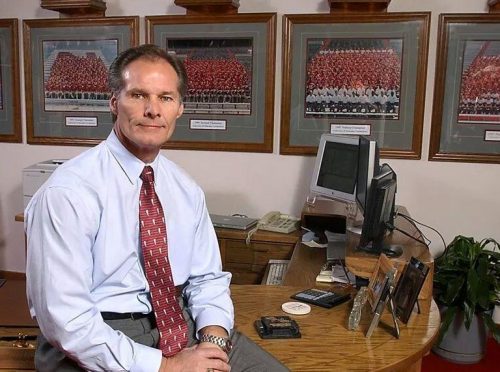
Boyd in his West Stadium Office ’95
Initially, I was as hard as could be, I didn’t want do the stupid stuff, didn’t want to do the ‘Boyd things.’ Honestly! I was fighting it, I was so negative. But I think it was one of those testing days for the forty yard dash and all that, and it was one day the scouts were there and we were running and stuff, but I remember I bought into his program and I gained tremendous muscle percentage compared to body fat and all that. I think I was second or third on the team and I had 6.5 percent body fat and my vertical jump had increased tremendously. So I had jumped up the highest on every one of the levels at that time, and my picture was in the paper. I have it to this day. I was jumping up on the vertical leap that day. And everything: just my practicing, my talents were getting much better. It was just because I bought into his program. I have to give him a lot of credit. He was a tremendous part.
And then there was Dennis Leblanc, my man. He saw a kid that, again, who was arrogant and didn’t care about anything. I just said, ‘Hey, Dennis, I’m here. I just want to get by.’ And he made it a point of his (and I think this was just his nature, this is what he did with every single guy), he’d match us up with tutoring and made sure we were there and check in on us. This was the other part Nebraska offered: when we’d go to class there were people there to ensure we were there. It was like, “You go to class. Here’s your classroom, here’s your books, here’s your schedule. If you don’t go, you don’t play.” But Dennis had a tremendous impact on my academics, keeping me in line. I’ll never forget that guy, as well.
Q: Was there a noticeably different work ethic or collective self-esteem or a swagger?
JL: Oh, by far. And like I say, when I think back it’s almost amazing -to be very frank and very honest- I did not start, there were guys who played in front of me. I did play enough to letter and all these things –but I was nowhere near any major contributor to being a part of the 13-and-0 success other than busting my butt at practice and doing those things.
But I will say that it was -to this day, going to the recent Holiday Bowls down there and all- it was those fans! Take Rex (Salmon), for example, and all those people at the San Diego sports bar you meet at for games, it’s like a family. They’re a family who accept you once you come into the program and it stays with you for life. Going to the Holiday Bowl, people came up to me who recognized me or my name and I was, ‘Geez, they somehow recognize me.’ I wasn’t a Lawrence. (laughs) I was nowhere near a Lawrence. I was nowhere near some of the other guys, but they treated me like I was a star. And the best part of it was that my wife got to see that. And without trying to get (pause)… emotional about it… that meant a lot.
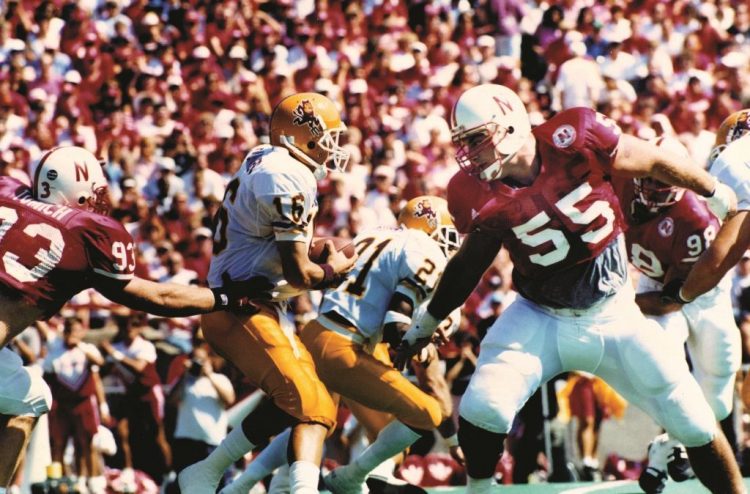
Q: Where is your wife from?
JL: My wife’s from Santa Barbara, California.
Q: I take it that she’s never been to a Husker home game?
JL: Not yet. But that’s my dream. After taking her to the Holiday Bowl I promised her, I said, ‘One day when our daughter and our kids are old enough we’ll take the trip back so you can see…’ She saw the Holiday Bowl and the people who showed up for that and dominated the parking lot and everything.
And I’ve actually converted the whole side of her family. It’s really fun: they wear my jerseys and they wear my rings… it’s gone from my immediate family to -every year, we’d go up north to their ranch north of San Francisco- and it was a tradition that we’d go to this bar that’s in town and we’d all wear our Nebraska gear for the Colorado game. But anyhow, I converted her whole family, and it shows you how empowering it is, how it’s a lifelong thing. And I didn’t realize all of this until years later when I’ve really begun to understand and appreciate all that I’d been a part of.
Q: So your last game was the Miami game, right? What stands out to you about that experience?
JL: Well, lets see: how about Warren Sapp coming up to the sidelines and telling Coach Osborne -in front of us, as if he’s a buddy- saying, “Coach, don’t run the ball my way. Don’t run it to my side.” And we stood there, right next to Coach Osborne, we stood there and looked at him. And anybody else would be, “Screw you, dude.” (laughs) But Coach Osborne, you know how he is. He was like, “Okay, okay. Sure thing.” And look what happened: they ran it right up his butt (laughs) and Ray Lewis’s. And Ray Lewis’s! If it was anybody else, how would you explain it? Unbelievable. You see the genuineness and the purity of people in their actions and how they lived their life, and I got to view that everyday. He was grandfatherly.
Q: Wow, grandfatherly? Hmmm, I‘m accustomed to hearing of Coach Osborne as a father figure, but not a grandfatherly figure.
JL: Well, I say that because Coach Brown as a father-type guy because he was closest and I interacted with him on a daily basis, and when I looked at the grand poobah, so to speak, the Head-Head-Head guy, it was Coach Osborne.
And he would acknowledge everybody, every single one of us, every time, everywhere. Coach Snyder at ASU… these people are in a position that just by nature are arrogant and chauvinistic, you know? They make uber amounts of money and, “Hey, if you’re gonna play for me and if you’re gonna start and make touchdowns, then I’ll recognize you.” But for Coach Osborne? It didn’t matter if you were Billy Bob Anybody, he treated everyone the same.
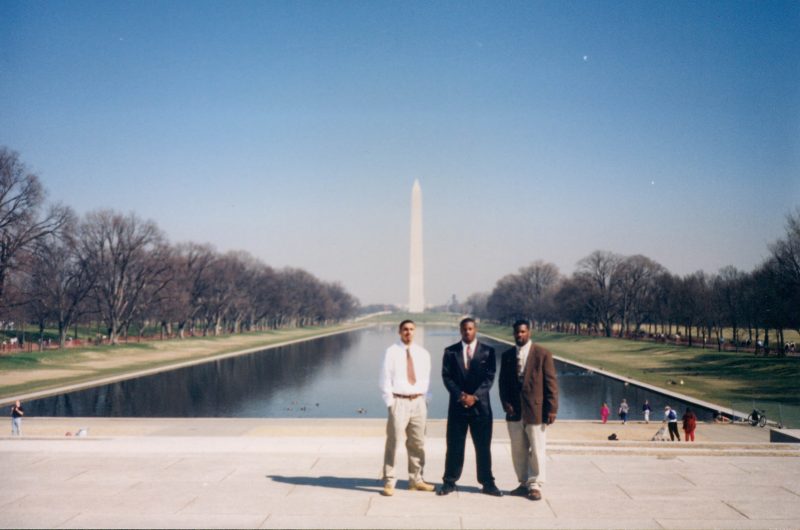
John Livingston, Tony Veland and Clinton Childs @ Washington, D.C
Q: Is there one great lesson or experience from your college experience that you use today or hope to pass on to your kids?
JL: Wow, just one? That the toughest part. I guess now, as a teacher, a lot of these things I learned there -and I teach middle school with the kids going through the hormonal changes and everything- but the one thing, if I had to narrow it down, I try to live my life by those experiences I went through and try to teach and guide the youth, telling them: ‘Life is short. And I know right now you’re telling yourself that there’s so many things going through your mind and you don’t want to hear what your parents are saying, what your teachers are saying, but somewhere down the line you’ll look back as I did and go, “You know, I probably should have taken that advice.”’ And maybe you’ll get through to one of these kids. And that’s what I try to do.
I’ll take this to my grave: I’m a firm believer that everything happens for a reason, and I think that my situation was supposed to happen the way it did with me going to another school. I don’t think in all of your research if there’s any other player, that I’m aware of, who had the opportunity after initially turning down an amazing, a great program like I did. To be given a chance, and then to top it off, to be part of a national championship team? That’s the best thing I can say. I take everything that happened during that entire experience and just live my life and try to give back to the kids that I teach.
Q: Well John, is there anything you think I haven’t asked about or touched upon that made Nebraska football so successful?
JL: Well, I would say that in the recruiting process at that time, it was a pretty evident pitch -because you’d get all these pitches from all these different schools and what made them so great and all of that- I think it was evident that: here’s a dominant program that can pretty much run through the Big 8 at that time, but was having difficulty come the bowl games with the Florida schools and the athletes, what have you.”We want to get over that hump, and we want to recruit players like yourself,” or all my buddies, Tyrone Williams, who were a little fast.

Available on Amazon.com
We didn’t come from programs that were running the ball all the time, but the whole idea that, “You have to give up that ego that you have and buy into this. And if you do, look what happens.” I mean, 13 and 0. I went to the White House and got to shake Bill Clinton’s hand. I got to be with Coach Osborne. I told that to my students one time, I said, ‘There’s one guy that I will… no matter what or where I am in the world, I will make sure that I’m there -and God bless his soul, I hope he lives forever- but when his time comes I just want to be there as a way to thank him for the opportunity that he gave me.’ (sniffles)
Q: Wow, John, that’s awesome. I really appreciate your time and I hope you get over your cold. It’s refreshing to hear your memories.
JL: Now I’m not gonna be able to sleep tonight! (laughs) You’ve got me all crying over here. Oh God, it’s just been years. I haven’t talked to anybody about this stuff, so thank you for helping me remember this stuff.
End conversation.
“He was grandfatherly.” Let’s take that in and ruminate on it for a moment, because the distinction begs for some thoughtful consideration. Tom Osborne has been called a visionary, a leader, character-possessed, a man of faith, stoic & stern, uncompromising and even over-compromising, composed, a father figure, etc., but ‘grandfatherly’? I wonder if other players with whom we’ve held conversations were of the same notion and yet spoke in the ‘father figure’ cliché out of habit? Perhaps this was only John’s impression and no one else’s. If the former was indeed the case, I can see how the team at that time would have resembled a family unit as many have described it, with the players acting the children, the staffers as uncles and aunts, the position coaches as fathers, with good ‘ol ‘Grandpa Osborne’ sitting atop the Husker Family tree. Considered a quasi-Moses figure for his leadership on the journey to the national championship Promised Land, some talked about the aura -the glow- about the man, almost as if he’d had contact on a frequent basis with the Almighty himself. (On the other hand, before first slaying the Goliath-like Miami U in the Orange Bowl many fans had been calling for his stoning) Needless to say, if you add up all those descriptions about the man, his management and mannerisms, Tom Osborne was a strikingly solid model of character and stately figurehead of leadership.
Do you recall Coach Osborne’s interview when he said that he tried to carve out a few minutes of time for each and every player a few times throughout the course of the season? It’s amazing how just that little bit of frequent personal contact was parlayed into ‘full buy-in’ and a sincere gratitude on behalf of the players. John’s “..he would acknowledge everybody, every single one of us, every time, everywhere” struck a chord, because it was so true. I don’t mean to brag, but I’ve been rubbed elbows with the accomplished and famous with their distant stares and uplifted noses, but to this very day one never gets the impression Tom Osborne would think himself above the fray -the “unwashed masses”- and unworthy of an acknowledgement of your presence. Now, don’t get me wrong and think me as making him to be and worshipping him as a demigod here, because that’s not the intent. But to do the man justice, it’s worthwhile to note his unique ability to dissociate his public actions from his ego and lofty position as Husker Head Coach, making one feel important, cared for and worthy of respect: “It didn’t matter if you were Billy Bob Anybody, he treated everyone the same.” I most heartily concur.
Notable quote #2:
John Livingston on the impact of the Husker Power Strength and Conditioning program: “This is the difference between an incredible program that takes every single aspect seriously, as opposed to one that just kind of goes with natural talent and hopes that it kind of flourishes.”
Copyright @ 2013 Thermopylae Press. All Rights Reserved.
Photo Credits : Unknown Original Sources/Updates Welcomed
Author assumes no responsibility for interviewee errors or misstatements of fact.
